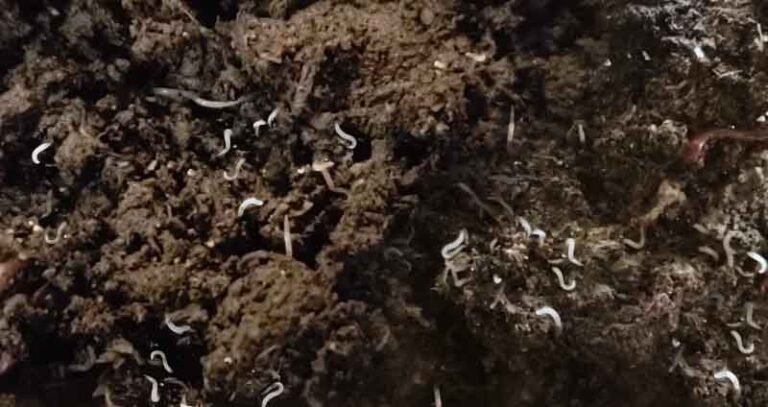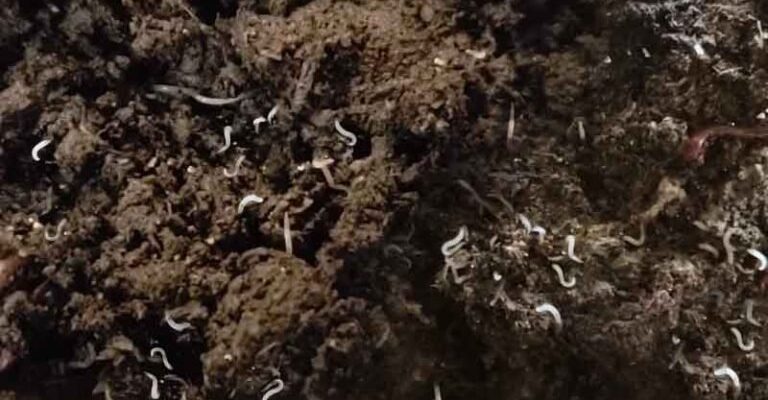
Grub worms, primarily the larvae of various beetles, are often misunderstood. When we think of composting, we might picture happy earthworms doing their thing, breaking down organic matter and improving soil health. But grub worms are a different story. They can get a bad rap for being pests, but in compost, they might just be doing more good than harm. So, should you embrace them or try to evict them? Let me explain.
What Are Grub Worms?
Grub worms refer to the larvae of beetles, the most common being the Japanese beetle. These little squirmers spend their early life underground before emerging as beetles. When they’re in their larval stage, they can be found munching on organic matter, which is where composting comes in.
You might picture them as tiny, white caterpillars with a soft body and a curled form. Grub worms can vary in size but generally grow to about 1-2 inches long. They love to feast on decomposing materials, making your compost pile a buffet! As they work through the compost, they help break down organic matter, which can be beneficial for your composting process.
Here’s the thing: while grub worms are mainly known as pests in gardens, in a compost setting, they can actually contribute to the decomposition process. It’s like having little workers helping to break down food scraps and yard waste. But are they doing this more harm than good? Let’s find out.
The Role of Grub Worms in Composting
Grub worms can play a positive role in your compost pile. They feed on the decaying organic material, turning it into nutrient-rich compost. This means that they contribute to the overall breakdown of compost, much like earthworms. Imagine them as tiny recycling machines, turning your kitchen scraps into rich soil.
While munching away, grub worms help aerate the compost. This is crucial because aeration promotes good bacteria, which break down organic matter faster. Good bacteria need oxygen to thrive, and when the grub worms burrow through the pile, they create air pockets, allowing airflow. It’s a win-win situation!
However, it’s important to monitor the population of grub worms in your compost. If they become overly abundant, they might start eating too much of the material you intended to compost. In moderation, they’re great allies, but too many can lead to problems. You’ll want to strike a balance to ensure your compost pile remains healthy.
Signs of Overpopulation
You might be wondering how to tell if grub worms have taken over your compost pile. A healthy compost pile should have a mix of organisms, not just one type. Here are some signs that you might have too many grub worms lurking in your compost:
- Excessive waste: If you notice a lot of partially decomposed material and not much finished compost, it might indicate that the grub worms are overindulging.
- Plant damage: Grub worms, especially as they grow, can cause damage to plant roots if they’re forming in the soil beneath your compost. Keep an eye on your plants; if they seem unhealthy, you might have a grub worm problem.
- Smelly compost: An overly wet or smelly pile can indicate that there’s too much organic matter left uneaten, which grubs are contributing to.
If you notice these signs, it might be time to rethink your composting practices. But don’t panic! A little adjustment can go a long way in managing the grub worm population effectively.
How to Manage Grub Worms in Your Compost
So, how do you maintain a healthy balance of grub worms in your compost without letting them take over? Here are a few tips:
1. Regularly turn your compost pile: This encourages airflow and prevents any one organism from dominating the space. Mixing things up can help keep the grub worms in check while ensuring other beneficial decomposers, like earthworms, thrive.
2. Maintain proper moisture levels: Grub worms thrive in moist environments, so check your compost moisture. Too wet or too dry can create an imbalance. Aim for a consistency similar to a wrung-out sponge.
3. Balance your greens and browns: Include a mix of “green” materials (like kitchen scraps) and “brown” materials (like dried leaves or cardboard) in your compost. This helps provide a varied diet for all the critters in your pile. Grub worms need a balance, too!
4. Monitor your temperature: Hot composting can help control grub worm populations. Keeping your compost pile hot enough (between 130°F to 160°F) helps eliminate unwanted pests while encouraging the right kind of decomposers.
With these strategies, you can prevent grub worms from becoming a nuisance while still benefiting from their composting efforts.
Alternatives to Grub Worms
If you find that grub worms aren’t the right fit for your composting goals, there are other options. You might consider using composting worms like red wigglers or European nightcrawlers. These worms are naturally more active in breaking down organic material and are often considered the “gold standard” for composting.
Another alternative is to use a hot composting method. This method relies on a high-temperature composting process that breaks down matter quickly and can kill off unwanted pests, including grub worms. Hot composting can seem a bit daunting at first, but it’s highly effective.
Lastly, you can also look into vermicomposting, which involves using a worm bin in addition to your compost pile. This allows you to control the decomposition process more closely without dealing with potential troubling pests!
In the grand debate of grub worms in compost piles—good or bad—it really comes down to balance. These little critters can be beneficial if kept in moderation, contributing to the breakdown of organic material and helping produce nutrient-rich compost. However, if they become too numerous, they can cause problems.
By keeping an eye on your compost and following a few simple management tips, you can maintain a healthy balance that includes not just grub worms, but earthworms and beneficial microbes too. After all, composting is all about creating a thriving ecosystem. So, let those grub worms do their thing, but don’t forget to monitor the party to ensure everyone gets along!

